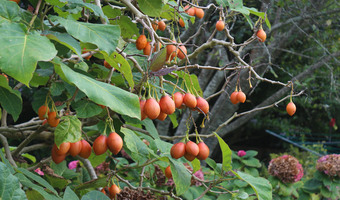 A visit to a friend’s tree tomato farm by George Wambugu became a light bulb moment that saw him quit a medical delivery job in Tanzania and now earning over Sh80,000 a month a far cry from what he was earning before.
A visit to a friend’s tree tomato farm by George Wambugu became a light bulb moment that saw him quit a medical delivery job in Tanzania and now earning over Sh80,000 a month a far cry from what he was earning before.
One weekend, he was invited by his friend back home in Nyeri and he describes what he saw in his farm as ‘‘wonders.’’
‘‘My friend had half an acre of land all decorated in red and green. What was in his farm was tree tomatoes that originated from New Zealand,’’ he said.
He saw the farm and knew growing tree tomatoes was his path to success. Mr Wambugu quit his job, asked his friend where he could buy the seeds and using the little cash that he had saved, he bought a 50 gramme tin of ‘Red Oratia” tree tomatoes seeds for Sh11,300.
Realizing that he didn’t have enough money, Mr Wambugu sold his only dairy cow to buy seedlings. Having tried hand at growing cabbages and beans, which didn’t do well, he says he decided to buy both the seeds and seedlings just to make sure that his efforts, this time round, would not fail him. Mr Wambugu says at first, he planted a few seedlings of the new species of Red Oratia tree tomatoes in a small parcel of land located near a river that his parents gave him.
From the first harvest, he was surprised to earn Sh20,000. This lifted his spirits and he planted more seedlings. Currently, Mr Wambugu has 2,000 trees of the fruits and he is preparing two more acres of land that he bought recently to plant more of this species that take eight months to produce fruits.
He prefers this species because about 97 per cent of the Red Oratia tree tomato fruit is edible and has no seeds inside and has a shelf span of six months before it goes bad. Apart from selling tree tomato fruits, he also sells seedlings of the Red Oratia species at Sh50 each. He sells his tree tomato fruits at Sh100 per kilogramme in Nairobi. “The market is there. Infact am not able to satisfy demand and this is the reason why am now coaching other farmers to grow this fruit,” he said. With a fruit processing plant set to be opened in Naromoru, he is eyeing higher returns.
On a daily basis, Mr Wambugu receives more than 30 farmers in his farm who come to learn how to grow this kind of fruit. He charges them Sh100 per person. In a month, after deducting all his expenses, Mr Wambugu, who is a school drop-out, says he is able to bank more than Sh80,000, money he says he never expected to earn.
He says transforming drunkard youth to useful people in the society is his greatest achievement. He hires 10 young people daily to help him prepare seedlings for sale. “This initiative has played a great role in changing behaviours of many youth who indulged themselves in alcohol taking and other drugs due to lack of jobs. Many have even started planting these fruits,” he said.
Mr Wambugu says he normally deducts some money from his workers’ wages and at the end of the month gives them seedlings equivalent to the deductions. Most farmers are turning to tree tomato farming as the ripe fruits can hang on the branches for six months without rotting or falling on the ground.
This, he says, gives the farmer enough room to search for better market for his produce. However, if a farmer fears his fruits might be stolen while in the garden, he can pick them and wrap them tightly in a polythene paper with no ventilation and this again will give them a shelf span of six months, he said.
For better results, Mr Wambugu encourages farmers to grow their own seedlings and use one wheelbarrow full of manure while planting, mixed with top soil. Mr Wambugu uses tap water for his plants. “I normally use a lot of money to pay my water bill and if I can get an alternative, I’ll be able to produce more fruits and hire more people” he said.
















Comments powered by CComment